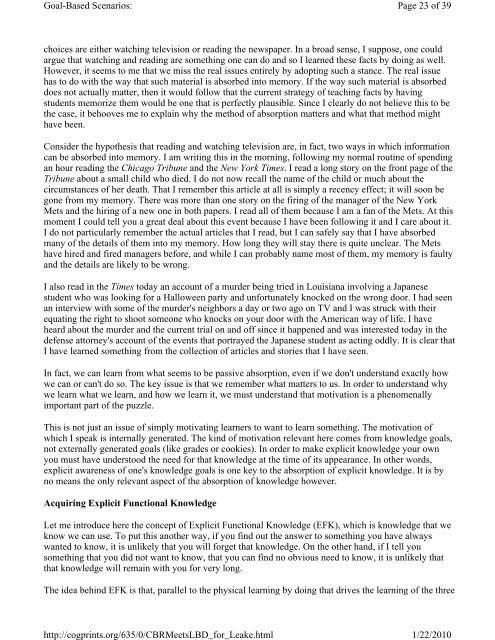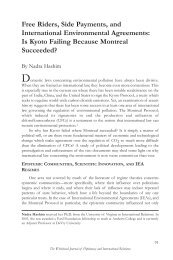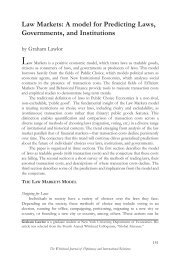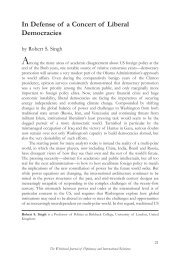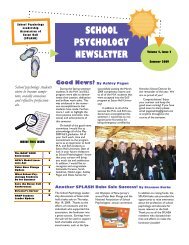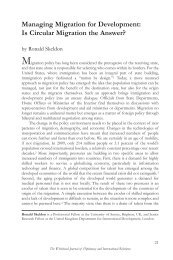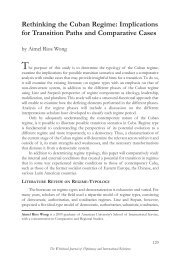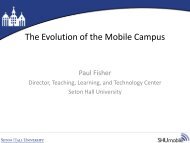Case-Based Reasoning Meets Learning by Doing
Case-Based Reasoning Meets Learning by Doing
Case-Based Reasoning Meets Learning by Doing
You also want an ePaper? Increase the reach of your titles
YUMPU automatically turns print PDFs into web optimized ePapers that Google loves.
Goal-<strong>Based</strong> Scenarios:<br />
choices are either watching television or reading the newspaper. In a broad sense, I suppose, one could<br />
argue that watching and reading are something one can do and so I learned these facts <strong>by</strong> doing as well.<br />
However, it seems to me that we miss the real issues entirely <strong>by</strong> adopting such a stance. The real issue<br />
has to do with the way that such material is absorbed into memory. If the way such material is absorbed<br />
does not actually matter, then it would follow that the current strategy of teaching facts <strong>by</strong> having<br />
students memorize them would be one that is perfectly plausible. Since I clearly do not believe this to be<br />
the case, it behooves me to explain why the method of absorption matters and what that method might<br />
have been.<br />
Consider the hypothesis that reading and watching television are, in fact, two ways in which information<br />
can be absorbed into memory. I am writing this in the morning, following my normal routine of spending<br />
an hour reading the Chicago Tribune and the New York Times. I read a long story on the front page of the<br />
Tribune about a small child who died. I do not now recall the name of the child or much about the<br />
circumstances of her death. That I remember this article at all is simply a recency effect; it will soon be<br />
gone from my memory. There was more than one story on the firing of the manager of the New York<br />
Mets and the hiring of a new one in both papers. I read all of them because I am a fan of the Mets. At this<br />
moment I could tell you a great deal about this event because I have been following it and I care about it.<br />
I do not particularly remember the actual articles that I read, but I can safely say that I have absorbed<br />
many of the details of them into my memory. How long they will stay there is quite unclear. The Mets<br />
have hired and fired managers before, and while I can probably name most of them, my memory is faulty<br />
and the details are likely to be wrong.<br />
I also read in the Times today an account of a murder being tried in Louisiana involving a Japanese<br />
student who was looking for a Halloween party and unfortunately knocked on the wrong door. I had seen<br />
an interview with some of the murder's neighbors a day or two ago on TV and I was struck with their<br />
equating the right to shoot someone who knocks on your door with the American way of life. I have<br />
heard about the murder and the current trial on and off since it happened and was interested today in the<br />
defense attorney's account of the events that portrayed the Japanese student as acting oddly. It is clear that<br />
I have learned something from the collection of articles and stories that I have seen.<br />
In fact, we can learn from what seems to be passive absorption, even if we don't understand exactly how<br />
we can or can't do so. The key issue is that we remember what matters to us. In order to understand why<br />
we learn what we learn, and how we learn it, we must understand that motivation is a phenomenally<br />
important part of the puzzle.<br />
This is not just an issue of simply motivating learners to want to learn something. The motivation of<br />
which I speak is internally generated. The kind of motivation relevant here comes from knowledge goals,<br />
not externally generated goals (like grades or cookies). In order to make explicit knowledge your own<br />
you must have understood the need for that knowledge at the time of its appearance. In other words,<br />
explicit awareness of one's knowledge goals is one key to the absorption of explicit knowledge. It is <strong>by</strong><br />
no means the only relevant aspect of the absorption of knowledge however.<br />
Acquiring Explicit Functional Knowledge<br />
Page 23 of 39<br />
Let me introduce here the concept of Explicit Functional Knowledge (EFK), which is knowledge that we<br />
know we can use. To put this another way, if you find out the answer to something you have always<br />
wanted to know, it is unlikely that you will forget that knowledge. On the other hand, if I tell you<br />
something that you did not want to know, that you can find no obvious need to know, it is unlikely that<br />
that knowledge will remain with you for very long.<br />
The idea behind EFK is that, parallel to the physical learning <strong>by</strong> doing that drives the learning of the three<br />
http://cogprints.org/635/0/CBR<strong>Meets</strong>LBD_for_Leake.html<br />
1/22/2010


